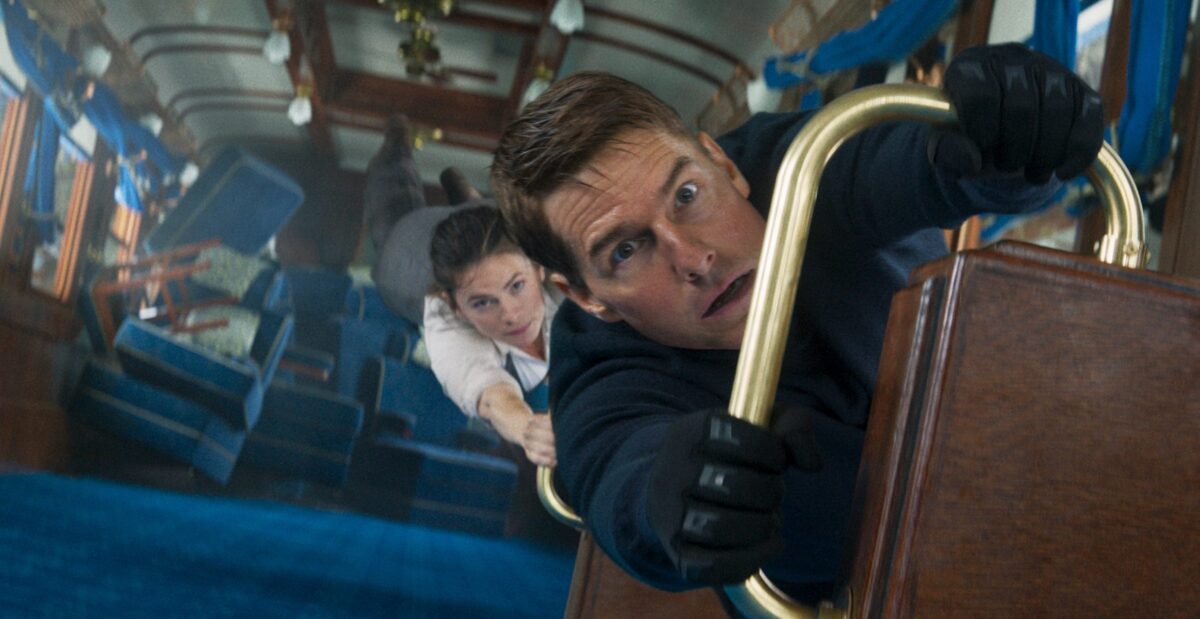
“Mission: Impossible — Dead Reckoning Part One” takes the spy franchise to a new level of high-octane action with the global threat of AI domination — and Tom Cruise wanted a visceral sound to the film while starring as legendary rogue agent Ethan Hunt.
“Tom wants to feel it, as only he can, having rehearsed it and filmed it many different ways as an actor and stuntman,” supervising sound editor James Mather told IndieWire. This is part of the “synaptic” philosophy of sound design that Cruse, Mather and the rest of the sound team have embraced, including last year’s Oscar-winning “Top Gun: Maverick.”
Take the brutal alley fight in Venice between Hunt and Pom Klementieff’s French assassin, Paris. The physicality of it becomes uncomfortable.
“You are in it so close to them, it feels like you’re trying to pull ’em apart,” Mather said. “And we went to town with that. And then Tom came and listened to it, and he was like, ‘It’s too clean, guys, it’s too specific, like a martial arts movie.’ He wanted it to be dirty and gritty and imperfect because that’s what makes it real.”
So Mather and re-recording mixer Chris Burdon remastered the production tracks, stripping out bits of dialog, breaths, and reactions, and then built it up again to emphasize “the sense of scuff and rough edge.”

But the greatest takeaway was leaning into a more intimate sound design: “I think the design for this movie was about following the eyeline with the audience’s, hearing with the ears, because everything was made purpose-built,” said Mather. “You’re always in the car or approximately just outside the window, but you are very close to them. So the hearing and the point of view of the soundtrack was very much about incorporating that sensitivity and sensibility.”
A good example is the wild car chase in Rome, where Ethan and Grace (Haley Atwell), a thief-turned-ally, are thrown together in a tiny Fiat, chugging along on narrow cobblestone streets, pursued by a giant Hummer, with cars flying around everywhere.
“It was a real ‘Tom and Jerry’ kind of thing,” Mather said. “And the fact that this Fiat had an electric engine meant that it didn’t really make any big motor sounds. It was the cobblestones and the wind, the whines and the whir of the electric motor, and the skids and the creeks. We had a lot of fun playing with the dynamic range in that. But we also found, as we got into the final mix, that less was much more in that scene.”
Multiple COVID delays provided the team extra time to iterate the soundtrack and shift the dynamics to make it more nuanced. They even benefited from a happy accident in 2021 when Mather got a call from his daughter complaining that the TV at home wasn’t working. Turns out the monitor and soundbar weren’t in sync, causing a strange crackling noise. Mather thought it sounded cool and recorded it. They were early into the mix, and director Christopher McQuarrie liked it too, so they experimented with the noise to evoke the AI villain called the Entity.
But it wasn’t until after a late screening attended by director Edgar Wright that the noise became much more prominent and improved the sound design. He recommended more of a signature cue for the Entity, which was evoked mostly through Lorne Bolfe’s score. “Once it felt right, we then populated the movie, and it became more and more of a character in the film,” Mather said. “And then we had to try and somehow replicate that process using modulators and EQ.”

The more intimate sound design achieved its greatest success during the roller coaster third act, featuring Ethan driving a motorcycle off a cliff, skydiving into the Orient Express train, and trying to hold on with Grace when the train falls off a broken bridge, one carriage at a time.
“The thing that made the big difference with this dive was the notion of negative sound,” Mather said. “So, when the bike goes off the cliff, and you’ve had everything building to that moment, and then you go into this kind of expansive surround air, and a tiny whistle of the wheels spinning on the bike, and a tiny flapping of Tom’s, and then the cut into him as he’s falling, he’s massive. With his arrival in the train, it was a very difficult balance to make work. We actually ended up putting the gunshot in with the smash in the window because the audience is expecting the gunshot.”
As for the wreck, which Mather calls “Buster Keaton on steroids,” it was important for the full-size train replicas to be custom-built for climbing around in them and for the camera operator [Jonathan Richmond] to dangle on wires in a harness close to Cruise and Atwell.
The highlight was the kitchen scene: “Everything has a moment to be totally isolated and experienced,” Mather said. “You get the hot oil, you get the fire, you get the plates. Watching the thing coming down, you’re also made aware that there’s still a train creaking and groaning and sliding down off the edge of this cliff.
“And, as we get to the piano room, once it’s gotten much quieter ’cause there’s nothing in there, you’ve got the creaking pin, which is the only thing stopping the piano from landing on them. You’ve got the twisting metal of the carriage, and then you cut to the exterior where you’ve got that single clunk of the thread on the carriage as it’s pulling under its weight. And it’s all just right. There’s just the last bit of debris falling down before the piano jeopardy — a bottle of fizz that lands and smashes. It’s about the courage of not overplaying stuff…and keeping the audience on the edge of their seat.”















